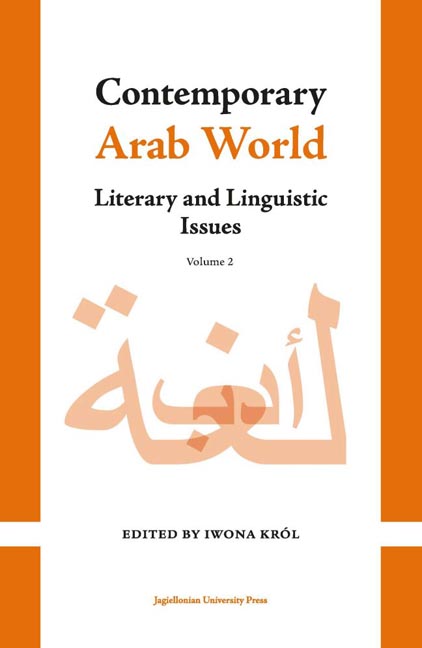Book contents
- Frontmatter
- Contents
- Introduction
- Karīm Maʿtūq and Other Winners of Amīr ash-shuʿarāʾ (Prince of Poets) First Contest
- Muḥammad Ibn Dāniyāl al-Mawṣilī – Arabic Aristophanes of Shadow Theatre
- Connotations of Home in Contemporary Palestinian Poetry – ʿAbd Allāh ʿĪsā’s Texts as an Example
- The “Mad Arab” Abdul Alhazred – Orient and Orientalism in the Works of Howard Phillips Lovecraft
- Functions of the Suffix -at in Nouns in Modern Standard Arabic
- Some Remarks on the Nature of Moroccan Regionalisms Based on the Analysis of University Admission Announcements
- Polish Deverbal Verbs and Their Hebrew Equivalents – A Contrastive Analysis Outline
- Annex: Abstracts – Streszczenia
- Miscellaneous Endmatter
Some Remarks on the Nature of Moroccan Regionalisms Based on the Analysis of University Admission Announcements
Published online by Cambridge University Press: 13 October 2023
- Frontmatter
- Contents
- Introduction
- Karīm Maʿtūq and Other Winners of Amīr ash-shuʿarāʾ (Prince of Poets) First Contest
- Muḥammad Ibn Dāniyāl al-Mawṣilī – Arabic Aristophanes of Shadow Theatre
- Connotations of Home in Contemporary Palestinian Poetry – ʿAbd Allāh ʿĪsā’s Texts as an Example
- The “Mad Arab” Abdul Alhazred – Orient and Orientalism in the Works of Howard Phillips Lovecraft
- Functions of the Suffix -at in Nouns in Modern Standard Arabic
- Some Remarks on the Nature of Moroccan Regionalisms Based on the Analysis of University Admission Announcements
- Polish Deverbal Verbs and Their Hebrew Equivalents – A Contrastive Analysis Outline
- Annex: Abstracts – Streszczenia
- Miscellaneous Endmatter
Summary
Introduction
Regional diversity of the Arabic language is usually understood as differences between local variants of countries or regions. Hence the interest in regionalisms arises on the ground of dialectology. However, despite the fact that Standard Arabic is generally considered to be a variant common to the Arab World, a certain degree of territorial differentiation can also be identified in this case. This differentiation is particularly visible in the lexical layer. Janusz Danecki writes:
Even though the written literary language of the entire Arabic world is relatively homogeneous, the first scratches are beginning to appear on it. The fragmentation and closing in of individual countries causes specific local phenomena to develop in various spheres of the linguistic structure. These are both systemic … and individual changes.
Zeinab Ibrahim identifies the causes of lexical variation both in intra-linguistic factors, such as the nature of the language itself, and external conditions – geographical, social, situational, as well as in the activities of language academies and the influence of the media. In her dictionary entry in the Encyclopaedia of Arabic Language and Linguistics, Ibrahim cites examples of such variation, referring, among other things, to the peculiarities of the Moroccan area.
Compared to older studies, such as “Searching for Modern Fuṣḥa: Real- life Formal Arabic” by Dilworth B. Parkinson, the analyses carried out by Ahmed Abdelali, the results of which were published in the article “Localization in Modern Standard Arabic,” also seem methodologically interesting. Their aim was to examine the actual language used in communication addressed to broad strata of society. The source material excerpted from national newspapers has been used to investigate the lexical characteristics of Modern Standard Arabic (MSA) of ten different countries where Arabic is spoken. A specialized spider program was applied as a data mining tool, which kept track of websites on an ongoing basis.
Objective of the study
This article does not attempt to index the regional variants of the vocabulary of Modern Standard Arabic of the Moroccan area. Its aim is a pragmatic- linguistic reflection on the complex nature of regionalisms and the reasons for their appearance in the language.
- Type
- Chapter
- Information
- Contemporary Arab WorldLiterary and Linguistic Issues, pp. 89 - 104Publisher: Jagiellonian University PressPrint publication year: 2022



